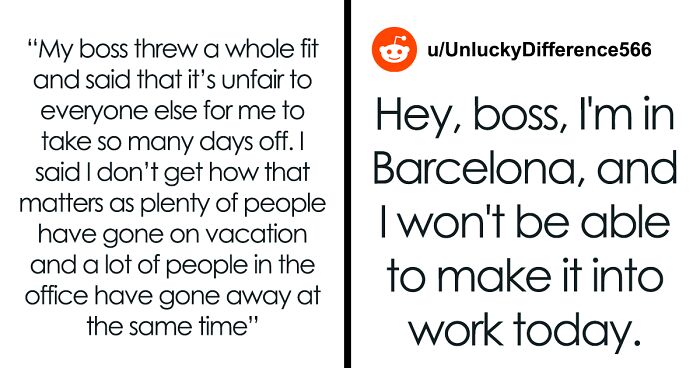
Boss Turns Down This Employee’s Vacation To Europe Because They Feel That Taking 7-9 Days Off Is ‘Unfair’ To Others
While there are various shades of work, ranging from this is daunting to this is the best thing since sliced bread, everyone needs a break sooner or later.
For this reason, vacations were invented. However, some very stingy, micromanage-y bosses hate it with a passion, consider it slacking or disloyalty to the company, and so conflicts arise.
Conflicts also find themselves on Reddit, in the form of r/antiwork posts explaining how this one boss essentially denied a time-off request all because it was 2 days too long and that was unfair.
More Info: Reddit
If you, as a manager, deny someone their time off, you better have a darn legit reason for it for you might be forced to accept reality afterwards
Image credits: fauxels (not the actual image)
An employee recently ranted about how their employer denied their slightly longer time off because it wasn’t fair to others
Image credits: u/EconomistOtherwise51
As you can imagine, the boss’ reasoning was as solid as a house of cards, and the employee quickly understood that they should probably leg it from there
Image credits: Eddy Billard (not the actual image)
So, the story goes that Reddit user u/EconomistOtherwise51 approached the r/antiwork community with a very anti-work experience.
The tl;dr of it is OP (i.e. original poster) wanted to take 7 (maybe 9) days off, but their request was denied. The boss claimed that taking any amount of days beyond 5 is absolutely barbaric as it’s unfair to other employees.
This left Economist confused as to how an extra 2 days off would make that much of a difference. But that was just part of the confusion. OP asked around the office to see if anyone realistically objected to it—nobody did. Everyone was cool with it.
What is more, they were fully staffed at that point and the vacation time period was during slow season, so this decision from management begged more questions than it answered. This led to a fit being thrown by the boss—another sign that something is not entirely right in the reasoning here.
While OP did explain that they can’t afford to just get up and leave, they seem to be tempted to do that, and will eventually be migrating to bigger and better waters job-wise. “These companies are ridiculous,” concluded OP.
Folks online threw their support at OP in a heartbeat. The general consensus was that Economist deserved to use their time off however they saw fit, and it wasn’t really a vacation request as much as it was a vacation notice, one that will inevitably happen and the boss-man has to deal with it.
Other than that, some pointed out that the boss is jealous of OP’s trip and is deserving of other inevitable scenarios, like taking 5 days off and calling in sick for the remaining 2, or when the time comes for the remaining 2 to happen, just to call in and say “Hey, I’m in [insert very distant European city here], I won’t be able to make it to work today” because ridiculous excuses call for ridiculous measures.
Image credits: Lukas (not the actual image)
Bored Panda reached out to author, speaker and consultant Sharlyn Lauby, well-known for her work on HR Bartender, to learn more about the nuances and intricacies of predicaments like the one OP is in.
Because the manager’s perspective isn’t elaborated upon in the original post, we asked Lauby to speculate on the reasoning behind the manager’s decision—to play the devil’s advocate, sort to speak.
“One of the first things to consider is maybe the manager would love to give the employee the time off but there’s some company policy that they need to support. And it wouldn’t be cool for the manager to say, ‘Me? I’d love to give you the time off, but the folks in HR are making me stick to the rules.’ And trust me, as a HR pro, that does happen.”
Lauby goes on to say that sometimes organizations create very strict rules and policies in order to stop circumventing. Like if an employee takes 5 days off, but calls out the remaining, say, 2 days, that puts the company into a bit of a bind. And what starts with 5 days can snowball into two weeks, and now that is unfair for the rest of the team.
But should a no happen for very questionable reasons, the employee can (and should) always approach the boss about it. “If the employee wants, they could go back to their manager and ask for the decision to be reconsidered. They could also go to human resources and express their concern,” explains Lauby. And if that fails, and the boss-man is on a power-trip of sorts, Lauby also suggests that this means more of these types of decisions are likely to happen again. And then it begs the question of whether it’s good for the employee and their career to continue working under these circumstances.
Image credits: Clem Onojeghuo (not the actual image)
For context, venture employer service company EmPowerHR explains that employers do have the power to deny vacation time, but [1] there has to be a legit, documented reason, and [2] it has to be non-discriminatory. An example of a legit reason would be if the notice was given too late and hence there isn’t enough time to find acceptable coverage.
However, denying someone time off will very often hurt morale, which in turn means lower productivity and higher turnover. And considering that two of the most common reasons why folks leave a workplace are [1] feeling burnt out and [2] management sucks, messing about with employee vacation time is like shooting yourself in the foot.
“I think employees at every level in the organization need to know how to manage conflict,” elaborates Lauby. “In our professional lives, we will be faced with conflict. (Personal lives too, but that’s for another day.) Some conflicts are big, others small. So, employees should learn how to manage conflict through dialogue, compromise, and consensus.”
“That being said, employees should not be taken advantage of. They work hard and like in this situation, they deserve time off. This doesn’t always mean that we get everything we want. But no one should feel they aren’t being supported.”
Sharlyn Lauby is an author, speaker and consultant, president of ITM Group Inc., a consulting firm that focuses on developing learning solutions that engage and retain workplace talent, and the face behind HR Bartender, a friendly place to talk about workplace issues.
You can check out Lauby’s books, “The Recruiter’s Handbook: How to Source, Select, and Engage the Best Talent” and “The SHRM Essential Guide to Talent Management,” as well as follow her on her socials: LinkedIn, Twitter, and Facebook.
But before you drift away into HR land, why not share your thoughts or stories in the comment section below!
And folks online supported the decision. That, and also suggested to have a bit of fun
103Kviews
Share on FacebookMy first thought was "7-9 days? He must have meant weeks". In Australia, we get mandatory 4 weeks' leave, and if you've saved up (or purchased, or take leave without pay) people heading to Europe would usually take 4-6 weeks. Aus is a long way from everywhere, so no one is going to Europe for a week. To only allow 1 week leave at a time is insanity.
Probably in America for them then. Closer to them a little (at least compared to us) and Vacation is not always a given there at all. Could also be elsewhere, though.
Load More Replies...If it is unfair, why does the boss not give your coworkers longers vacations?
- boss, i AM taking MY vacations as planned. if it is unfair for the others, YOU fix it for them. it is YOU who are abusing them, not me. see you in a week!
Load More Replies...How have bosses gotten so obnoxiously ego driven these days? How is this not an unfulfilled yearning to be perceived as better than your staff and a righteous slave owner? It is disgusting in the extreme that so many have this attitude after all the sacrifices and rhetoric about freedom and equality. I just can't anymore with this utter c**p.
My first thought was "7-9 days? He must have meant weeks". In Australia, we get mandatory 4 weeks' leave, and if you've saved up (or purchased, or take leave without pay) people heading to Europe would usually take 4-6 weeks. Aus is a long way from everywhere, so no one is going to Europe for a week. To only allow 1 week leave at a time is insanity.
Probably in America for them then. Closer to them a little (at least compared to us) and Vacation is not always a given there at all. Could also be elsewhere, though.
Load More Replies...If it is unfair, why does the boss not give your coworkers longers vacations?
- boss, i AM taking MY vacations as planned. if it is unfair for the others, YOU fix it for them. it is YOU who are abusing them, not me. see you in a week!
Load More Replies...How have bosses gotten so obnoxiously ego driven these days? How is this not an unfulfilled yearning to be perceived as better than your staff and a righteous slave owner? It is disgusting in the extreme that so many have this attitude after all the sacrifices and rhetoric about freedom and equality. I just can't anymore with this utter c**p.

 Dark Mode
Dark Mode 

 No fees, cancel anytime
No fees, cancel anytime 



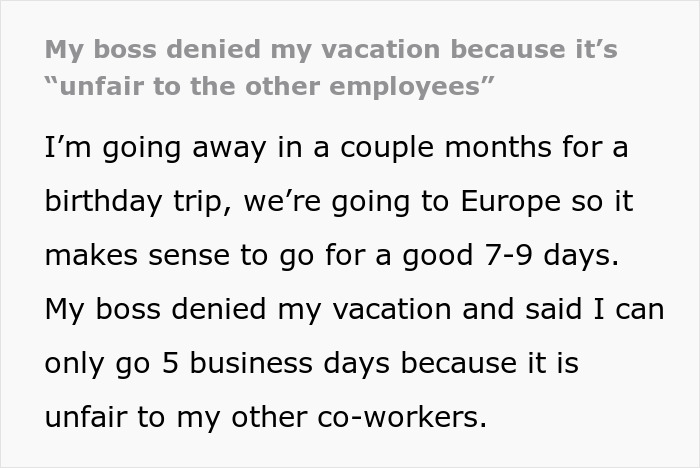
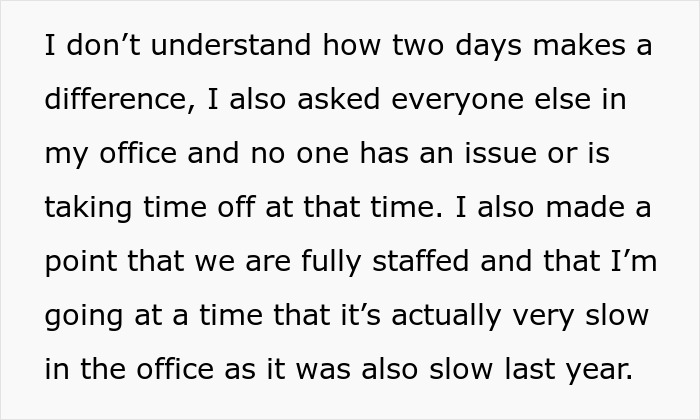
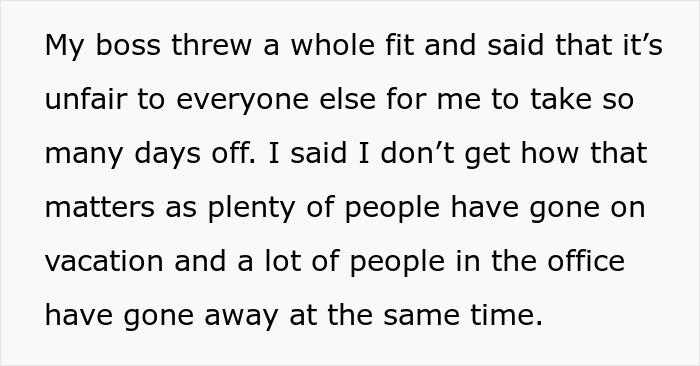
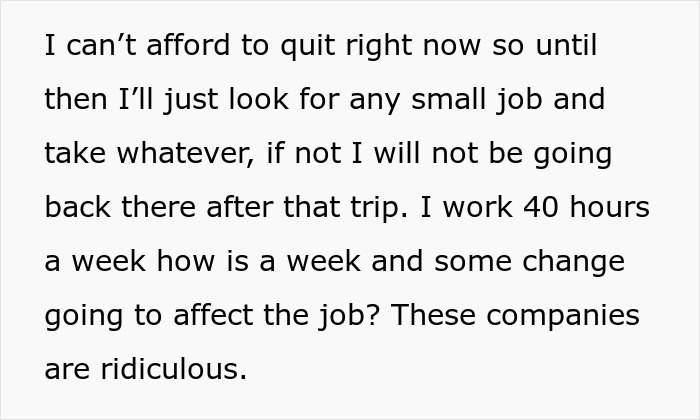





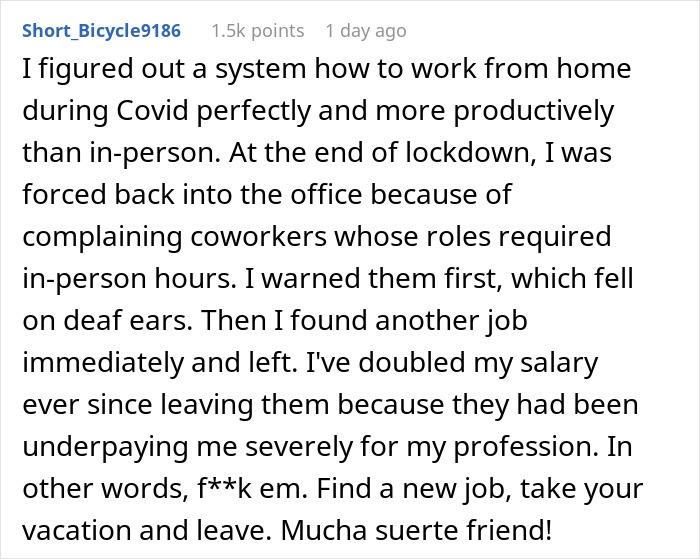
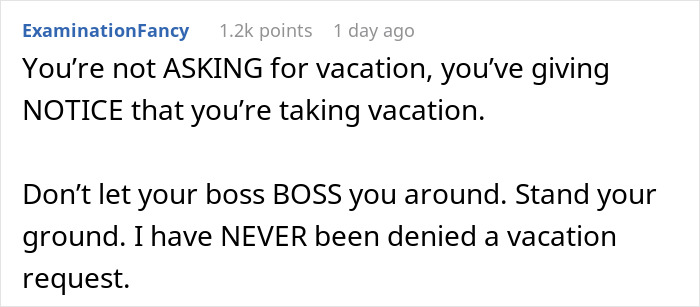

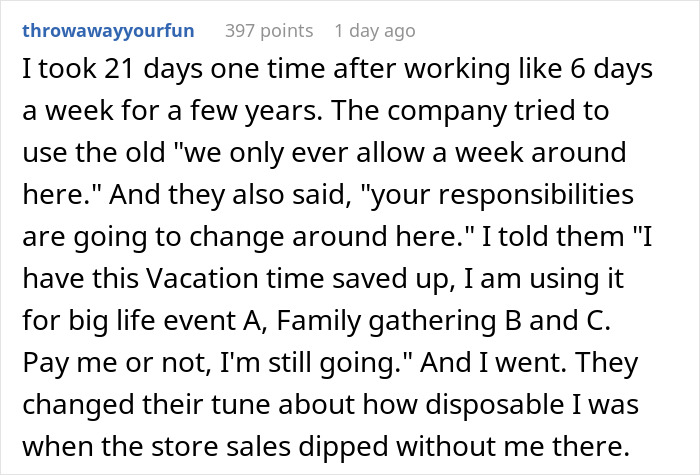
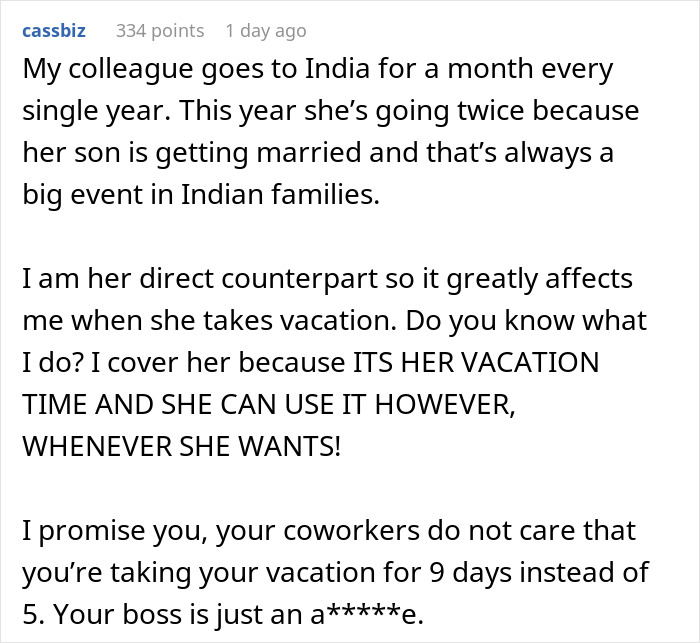

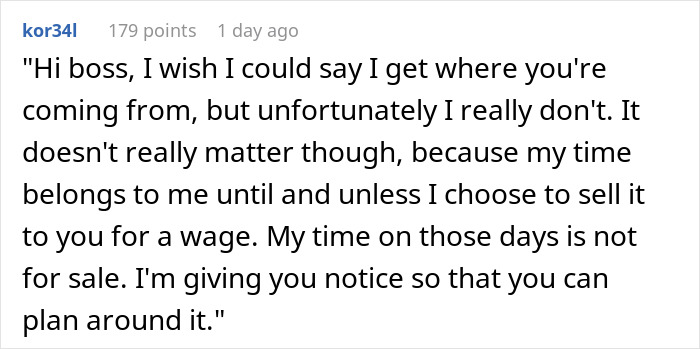















































74
29